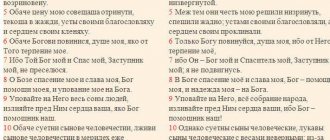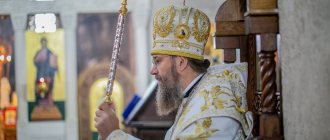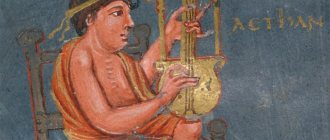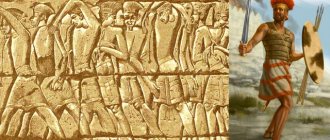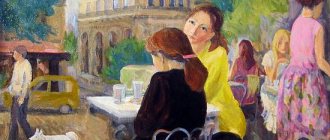The creation of the Psalter took centuries. Many of the works included in the collection were composed by the prophet David. But some texts supplemented his works after the end of the reign of this great ruler.
Psalm 106 is one of these. Its authorship belongs to an unknown righteous man, who expressed gratitude to God for the salvation of the Jews, who had been scattered among other nations for a long time, for the chance to create their own state on the blessed lands of Palestine.
Text of Psalm 106
In the Orthodox tradition, Psalm 106 is sung in Church Slavonic during church services. It will be a big advantage for the laity to read this text at home, but for a better understanding of its meaning, you will have to “arm yourself” with the interpretations of the Holy Fathers. Those who find it difficult to work with prayer in this form are not prohibited from using a modern translation into Russian.
With accents in Church Slavonic
In Russian
Theological analysis
To better understand the text, believers are recommended to read interpretations of Psalm 25 written by experienced confessors. For example, Evfimy Zigaben analyzes each line in detail. For those inexperienced in reading the Bible, it is better to first rely on the studies of the Holy Fathers.
verses 1-5
The spiritual state of the persecuted David can be clearly seen in the second line, where he asks God to search his heart and mind (in the Slavic translation - kidneys and heart). This should show the Creator that in the very depths of existence, not even a thought arose about taking the throne of Saul or causing him any damage. This behavior is explained by the fact that the righteous person feels the care and disposition of the Lord towards himself. Therefore, he must imitate Him in his own life.
The author sees the source of his sinless life not in himself. He attributes all virtues to the Creator alone. Every action performed during the day must be considered from the standpoint of future eternity. Will he not upset the Creator by this, will he violate any commandment? It seems incomprehensible to modern people that even sitting at the same table with unrighteous people was considered a bad deed. This can be judged by line 5.
Everyone has to interact with unkind people from time to time. Pious Christians should not continue to see them, have joint affairs, much less be friends. After all, if a positive environment brings benefits, a bad one can cause harm.
verses 6-12
Psalm 25 in Russian is quite different from the Slavic text. For a full study, you should carefully read both options and compare them. Before looking at the line-by-line translation, you should pray to Christ that He would open your mind to assimilate the messages that the Holy Spirit put into the lines.
Not only true believers, but also hypocrites can fulfill God’s commands. The difference is that the former receive real spiritual joy from this, while the latter only hope to pay off the formidable Lord. But David was not like that.
- He took everything that the Lord bequeathed with complete seriousness. Had a firm intention to do His will (“washed my hands in innocence”).
- In the psalm we see an example from the daily rituals of the clergy of ancient times. They washed their hands before entering the altar. Even without being a clergyman, it is appropriate for everyone to clear their conscience by repentance.
We advise you to study the Lord's Prayer
David, being a high-ranking man, did not consider it shameful for himself to perform proper rituals together with ordinary people. It was customary for the Jews to walk around the altar on which the carcass of a slaughtered animal was burning. Obviously this took time. The righteous man did not forget to offer praise. It is the duty of every believer to thank and praise the merciful Savior.
History of writing
Studying the content of Psalm 106, we can make the assumption that it was written after the liberation of the Jewish people from Babylonian captivity. At that time, people were busy sowing fields, planting grapes, and restoring old buildings.
The author, whose name the experts were unable to find out, describes in great detail the disasters that the righteous faced. He immediately draws the reader’s attention to the fact that in such moments God does not abandon those who are faithful to Him; He always extends a helping hand to those who suffer.
On what occasions is Psalm 106 read?
The 106th psalm became part of the 15th kathisma. Given this, it is not surprising that Christians who attend Orthodox churches can hear it performed in Church Slavonic on Fridays.
For a private appeal to the Lord, a better understanding of the deep meaning of the work, reading the Russian translation of the prayer is allowed. Psalm 106 is sung as an exception twice a week during Lent. It sounds in churches on Tuesdays and Fridays.
They do not read a song of praise, like kathismas in general, on Bright Week.
Arseny of Cappadocia said a lot about the everyday situations in which Psalm 106 can be read. According to the monk, this work is universal; it can be used to ask God for blessings in various everyday situations, however, it turned out to be most effective in the treatment of female infertility.
Interpretation
The author thanks the Almighty on behalf of all His faithful, everyone who came to take part in the ritual of sacrifice. The song praises God as the Deliverer. In general, it can be divided into several parts. Together they create an integral composition: condemnation for the Fall (suffering in response to lawlessness), a request to grant salvation, an answer to prayer.
The unknown author of Psalm 106 set himself the following goal: to reach out to brothers and sisters, to prove the need to glorify the Almighty and obey Him in humility.
The true meaning of the work is revealed by careful study of its individual verses:
- Verses 1 and 2 are praise to the Lord.
- Verse 3 describes the passage of the Jewish people through the Red Sea. Here the author mentions the four cardinal directions, from which, by the will of the Almighty, the descendants of Abraham were again gathered. They were then given the blessed lands of Palestine.
- Verses 4 to 7 are a description of the difficult moral state of the people, their desire to make Palestine their home again.
- Verses 7 and 8 - the emphasis is on the Jews receiving instructions from above. By focusing on them, they can return to their homeland.
- Verses 9 to 19 - the psalmist conveys the whole range of positive emotions that people experienced upon returning to their native lands. They rejoice, knowing that their prayers were not in vain.
- Verses 19 to 22 - according to the author, being in captivity is like being in a prison cell, where the prisoner faces certain death. The word of God saved the chosen people from destruction.
- Verses 23 to 32 - this part of the work describes the torment of the Jews, their hard life in captivity, the hardships from which they were freed by the will of the Almighty.
- Verses 33 and 34 - the author allows the reader to imagine what Palestine was like after many years of war that devastated its land.
- Verses 35 to 38 are an expression of rejoicing before the One Creator, with the help of whom the Jewish people managed to restore their homeland. For their hard work, the righteous were also rewarded with a bountiful harvest;
- Verses 39 to 43 - the emphasis is on the fact that in the past the enslavers of the Jews perished while they themselves were restored.
The main theme of Psalm 106 is the Lord’s help to the pious, in particular to the Jewish people, who were freed from the captivity of their enemies.
106:1-3 Praise the Lord, for He is good, for His mercy endures forever!2 Thus let the redeemed of the Lord say, whom He delivered from the hand of the enemy, 3 and gathered from the countries, from the east and the west, from the north and the sea.
And again the call to praise Jehovah: there is a reason for it, for His people were delivered from the hand of invaders and gathered from all nations. Actually, here we are talking about all those redeemed by the Lord, not necessarily just about literal Israel - we are talking. The singer knows that the people of Jehovah from all nations will be gathered, and this people will be delivered from the hand of both literal invaders and spiritual saboteurs.
106:4-7 They wandered in the desert along a deserted path and did not find an inhabited city;
5 They suffered hunger and thirst, and their souls melted away within them. 6 But they cried out to the Lord in their affliction, and He delivered them from their troubles, 7 and led them on a straight path, so that they would go to an inhabited city.
Here we can talk about Israel, led through the desert when leaving Egypt and the fact that God, although he punished them with the desert and did not want to see those who persisted in their lusts - in the Promised Land, but, nevertheless, their cry for help took care of them until their time in the desert expired, and did not abandon them to their fate.
106:8 Let them praise the Lord for His mercy and for His wonderful works for the sons of men:
The singer wants all the sons of men to glorify God, but not just like that, but for his great deeds for people, so that they have the opportunity to find joy in life - even in this century. Many, alas, do not notice what God has already done for the sons of men and take the improvement of the earth for granted. Well, after all, honor the kings of nature, they don’t have enough intelligence to appreciate the magnitude of God’s works, but it’s very easy to spoil other people’s property - God’s planet.
106:9-11 for He has satisfied the thirsty soul and filled the hungry soul with good things. 10 They sat in darkness and the shadow of death, bound in sorrow and iron; 11 For they did not obey the words of God and were heedless of the will of the Most High.
But it is not only material benefits that a person is abundantly showered with from God. Spiritual light came to the hungry and thirsty on earth, for those sitting in complete ignorance and in complete spiritual darkness did not have the opportunity to enjoy life: the sorrows of this age darken all the ignorant.
Everyone who neglects the word of God and His instructions continues to sit in the darkness of ignorance, and that is why they are shrouded in sorrows, as if behind prison bars they are sitting captive in troubles and no one can escape from them without enlightenment from God.
106:12 He humbled their hearts by their works; they stumbled, and there was no one to help.
God had no other choice but to show the rebellious people all the “charm” of independence from Him: sorrow and backbreaking work - that is the whole joy of those free from the Lord. When a person has the opportunity to compare days of prosperity with days of hopeless exhaustion, then it is easier for him to appreciate the days of prosperity and make his heart feel at least some gratitude to the One who provides them with prosperity. So God is forced to accustom humanity to goodness - through the knowledge of evil, humbling their “lordly” pretensions - by the need to work hard for himself - in those days when He ceases to patronize them for their disobedience. Otherwise, the sons of men grow up to be ungrateful and lustful consumers instead of grateful and loving sons of God.
So it is in life in the relationship between parents and children: those parents who do not teach their children to be independent and try to do everything instead of their children will inevitably reap ungrateful and stiff-necked children, raising them to be capricious “barchuks”. In order to prevent this from happening, you need to take God’s example and stop looking after your children at least periodically, especially during those periods of their lives when they are ungrateful and disobedient to their parents.
106:13 But they cried out to the Lord in their sorrow, and He saved them from their troubles;
And just as children, forced to live in difficult conditions for some time, eventually turn to their parents for help, so rebellious Israel also always turned to God when they no longer had the strength to endure difficulties. And God always came to their aid again and again in the hope that they would finally come to their senses and understand that there was no need to resist God’s ways and act arrogantly.
106:14 brought them out of darkness and the shadow of death, and broke their bonds.
God can lead His human children out of spiritual and physical darkness; if only a person had a desire to get out of the wilds. And God is always ready to lend a helping hand.
106:15,16 Let them praise the Lord for His mercy and for His wonderful works for the sons of men:
16 For He has broken in pieces the gates of brass and broken the ropes of iron.
And how can one not praise such a God? Yes, we all simply must constantly thank our God for the fact that He patiently tinkers with all of humanity in the hope that at least someday we will come to our senses. That at least someday we will come to the correct conclusion that there is no one other than God worthy of our devotion and love, for only He is always ready and able to help a person
106:17,18 The foolish suffered for their wicked ways and for their iniquities;
18 Their souls turned away from all food, and they approached the gates of death.
The reckless will always suffer from illness and approaching death, and this is fair: whoever bites the “hand” of the Giver of life and blessings will one day lose it, and no one will want to give anything to the reckless, neither health, nor wisdom, nor joy life - such people cannot wait from God (this does not mean mental insanity, but what is meant is spiritual depravity to such an extent that they do not want to recognize Jehovah as their God). Recklessness here acts as a spiritual and moral, and not an intellectual or mental category.
106:19 But they cried out to the Lord in their sorrow, and He saved them from their troubles;
And, it would seem, everything is clear and understandable with the foolish of God’s people. But as soon as they cried out to the Lord, He immediately picked up their cry, for He was waiting for their conversion, and did not cease to hope that they would come to their senses: God does not want the destruction of men, and therefore He is patient and merciful.
106:20 He sent His word and healed them, and delivered them from their graves.
This text is prophetic about Christ Jesus, who rescued humanity from the shadow of death and freed it from the graves in the sense that thanks to the atonement, people have hope of healing and resurrection in the age to come.
106:21 Let them praise the Lord for His mercy and for His wonderful works for the sons of men!
And we will all show blatant ingratitude if we do not feel the need to thank God and glorify Him for all the good that He does for each of us for the sake of our own well-being.
106:22 Let them offer sacrifices of praise to Him and let them proclaim His deeds with singing!
And therefore our hearts should encourage us to glorify the Lord and thank Him all our days with the sacrifice of our lips and praise in His honor, and to proclaim everywhere about His wonderful deeds for mankind.
Well, if we are not prompted to do this, and if our heart does not sing from thoughts of God, something is clearly wrong with us, and our heart turns out to be stone, impenetrable or incorrect, if we notice obvious benefits from the Lord we don't want to. 106:23-28 Those who go on ships to the sea, doing business on the great waters, 24 see the works of the Lord and His wonders in the deep: 25 He says, and a stormy wind arises and lifts its waves high: 26 They ascend to the heavens, they descend to the depths ;
their soul melts away in distress; 27 They spin and stagger like drunken people, and all their wisdom disappears. 28 But they cried to the Lord in their affliction, and He brought them out of their distress. Using the example of those traveling by sea, the psalmist showed here how it is possible to notice the miracles and help of God, for in the circumstances of the elements it is very difficult not to notice the good deeds of the Lord in saving us from the depths of the sea. For if a storm breaks out at sea, then the smell of death is very clearly felt, and if God does not calm the elements and help to escape, then there is no other salvation from anyone. Sailors appreciate God’s care for themselves, that’s why they call on His help every time during disasters at sea, that’s why they are grateful to Him, that’s why it’s impossible to dissuade them from the fact that God doesn’t help them if they survive a storm.
106:29-31 He turns the storm into calm, and the waves become silent.
30 And they rejoice that they have calmed down, and He brings them to the desired landing place. 31 Let them praise the Lord for His mercy and for His wonderful works for the sons of men!
Sailors see how God calms every storm and calms the waves of the sea, how can they not sing glory to the Lord and give praise for His miracles? That is why the singer calls on all the sons of men to glorify the Lord, even if they have not yet encountered the breath of death: the Lord always has something to praise and praise for. If you think about it, of course, and don’t be a reckless animal.
106:32 Let them extol Him in the assembly of the people, and let them glorify Him in the assembly of elders!
As we see, the meeting of God’s people has always taken place, and the elders are in it not by human whim, but by the will of God, for this is how God arranged the society of His people in order to maintain order in it. Where there is no order, there is disorder and everything is bad, there is no prosperity for the people.
So, the glory of the Lord is appropriate in the assembly of God’s people; there is no place on earth where one could remain silent about the God of miracles.
106:33,34 He turns rivers into deserts and springs of water into dry land,
34 and fertile land into salty land, because of the wickedness of those who live on it.
If the nations who know God remain in wickedness and do not appreciate the works of God for them, God leaves their inheritance, and then the rivers of this inheritance will dry up, the earth will become salt, for without God’s care everything sooner or later comes into disrepair.
106:35-38 He turns the desert into a lake, and the parched land into springs of water;
36 And he makes the hungry settle there, and they build a city to dwell in;
37 They sow the fields and plant vineyards, which bring them abundant fruit. 38 He blesses them, and they multiply greatly, and He does not diminish their cattle. But for those who hunger and thirst for his word, God turns His eyes to the deserted places of the earth and revives them for the sake of these people. And he helps them build cities, and life resumes where there was severe desolation and desolation: the vineyards give their fruits, and livestock multiply throughout that land, and the people of God prosper under the supervision of God. Where the eyes of the Lord are, there is life, abundance and happiness.
106:39,40 They diminished and fell from oppression, distress and sorrow -
40 he pours out dishonor on the princes and leaves them to wander in the wilderness where there are no paths.
An interesting remark by the psalmist: disasters and sorrows and the decrease of the people often occur because of the princes of the people, which is why God is angry, first of all, with the princes of His people, and leaves them to wander in the spiritual desert, where there is no word of God and admonition for what the path of life - to get out of there. That is why princes most often do not accept the word of God’s instruction, because they go into independent wandering of their own minds.
106:41 He rescues the poor from distress and multiplies his family like a flock of sheep.
The rest of the people, who are not among the princes, and who are not carried away by their arrogance towards the spiritual desert - God himself strengthens, when there is no hope for princes, finds a way to help them and increase in number. This has always been the case among Jehovah's people. So it will be until the end of this age: if princes become worthless, God finds another way to help those who hunger and thirst for His ways, but He never leaves them without hope and without help.
106:42 The righteous see this and rejoice, but all wickedness stops its lips.
Those who know about this state of affairs from God certainly see how He helps the “poor” of His people, the hungry and thirsty, finding a way to help them without the wicked “princes.” That is why they rejoice at the picture of God’s help for those who seek Him. For through them God helps his people, through them he stops the mouths of the wickedness of the princes, showing the “poor” a way out of the spiritual desert of the “principality,” which has become wicked because of the wickedness of the princes.
106:43 He who is wise will notice this and understand the mercy of the Lord.
Not everyone will notice how God helps the “poor” and poor in spirit among His people. But he who is wise among His people will certainly notice. And about the last days it is said about the prudent that they will admonish many “poor” and hungry, when their kings are powerless to feed the sheep of God - they will begin to admonish and guide to the righteousness of God all who need it - Dan.11:33, 12:3.
